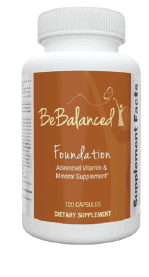
Understanding Supplement
Production & Regulations

Understanding Supplement
Production & Regulations

Understanding Supplement
Production & Regulations
1
1
1
BeInformed
BeInformed
BeInformed
On government regulations to protect the supplement industry.
2
2
2
BeConfident
BeConfident
BeConfident
That the ingredients are potent, pure & bioavailable and that what’s on the label is in the bottle.
3
3
3
BeSure
BeSure
BeSure
Your supplement regimen fits your needs to get measurable results.
Well Fed but Undernourished:
American Epidemic
Well Fed but Undernourished:
American Epidemic
Well Fed but Undernourished:
American Epidemic
Due to
Due to
Due to
High intake of processed foods.
High intake of processed foods.
High intake of processed foods.
Decline in the levels of nutrients in our soils.
Decline in the levels of nutrients in our soils.
Decline in the levels of nutrients in our soils.
Increase in chronic health conditions that influence nutrient needs.
Increase in chronic health conditions that influence nutrient needs.
Increase in chronic health conditions that influence nutrient needs.






Learn to avoid
Learn to avoid
Learn to avoid
Fragmented supplement regimens that are not meeting your needs.
Fragmented supplement regimens that are not meeting your needs.
Fragmented supplement regimens that are not meeting your needs.
Ineffective supplements that can’t be absorbed.
Ineffective supplements that can’t be absorbed.
Ineffective supplements that can’t be absorbed.
Supplements that have fillers or dangerous remnant ingredients.
Supplements that have fillers or dangerous remnant ingredients.
Supplements that have fillers or dangerous remnant ingredients.



“Improving the health status of the
United States citizen’s ranks at the top of the national priorities of the federal
government.”
“Improving the health status of the
United States citizen’s ranks at the top of the national priorities of the federal
government.”
“Improving the health status of the
United States citizen’s ranks at the top of the national priorities of the federal
government.”
- Federal DSHEA 1994 Dietary Supplement Health and Education Act
- Federal DSHEA 1994 Dietary Supplement Health and Education Act
- Federal DSHEA 1994 Dietary Supplement Health and Education Act
FACTORS
FACTORS
FACTORS
At BeBalanced, we believe that many health, lifestyle, diet, and food regulatory factors contribute to why Americans are UNDERNOURISHED, resulting in the need for supplementation.
At BeBalanced, we believe that many health, lifestyle, diet, and food regulatory factors contribute to why Americans are UNDERNOURISHED, resulting in the need for supplementation.
At BeBalanced, we believe that many health, lifestyle, diet, and food regulatory factors contribute to why Americans are UNDERNOURISHED, resulting in the need for supplementation.
Understanding these factors is KEY to getting the nutrients your body needs for optimal health.
Understanding these factors is KEY to getting the nutrients your body needs for optimal health.
Understanding these factors is KEY to getting the nutrients your body needs for optimal health.
Fact 1: Americans suffer from nutrient deficiencies with significant health implications
National Health and Nutrition Examination Survey (NHANES) indicates that U.S. children and adults have high rates of deficiency of vitamins A, B6, B12, C, D, E, and folate, as well as the mineral iron.
Half the calories Americans consume come from nutrient-depleted, ultra-processed foods, including refined flours/seed oils, leaving many people undernourished.
Fact 2: Food Has Failed Us
The below findings suggest that relying entirely on food for our micronutrient intake may result in a failure to meet our nutritional needs.
Modern intensive agricultural methods harm our health not only by exposing us to ever-increasing levels of pesticides, but also by stripping nutrients from the soil in which our food grows. This results in food with lower levels of micronutrients. In addition, as crop yields have increased with the rise of intensive agriculture, a “dilution effect” has taken place, further lowering the average concentrations of minerals in crops.
For example, studies conducted in the United States and the United Kingdom indicate that cultivated vegetables and fruits have experienced median declines of 5- 40% in protein, calcium, phosphorus, riboflavin, and vitamin C content between 1950 and 1999.
Fact 3: Contributing Factors
Chronic Intestinal Disease:
The latest research indicates that an altered gut microbiota compromises nutrient absorption and promotes deficiencies of certain nutrients such as vitamins A, D, E, K, and B12, as well as iron. Many chronic diseases are associated with alterations in the gut microbiota, so the epidemic of chronic disease and the resulting changes in the gut microbiome may be why Americans experience high rates of malnutrition. Restoring balance to a person’s microbiome, may make it possible to resolve some nutrient deficiencies.
Toxic Exposures Influences Nutrient Needs:
Toxins in the body contribute to undernourishment. Heavy metals (lead, arsenic, mercury) can interrupt the absorption, metabolism, and utilization of essential minerals which can lead to deficiencies of many minerals such as calcium, iron, and zinc. Optimal intake of essential minerals via proper diet and supplementation, can help displace heavy metals from the body helping to solve basic mineral deficiencies.
Food allergies/sensitivities:
Avoidance of certain foods, due to intolerances, can cause nutrient deficiencies. Supplementation or nutrient-dense foods can be used to satisfy an individual’s nutrient needs to fill in the gaps.
Fact 4: The RDA is not Enough
As we know, the RDA is only the minimum nutrient intake needed to avoid acute symptoms, not the optimal nutrient requirements for vibrant health. The RDA levels do not consider all factors such as an individuals’ activity level or presence of chronic health conditions where higher nutrient intake would be beneficial. We now know that one in two Americans have a chronic disease and one in four has multiple chronic diseases. This makes the nutrient intakes required to promote optimal health higher than what the RDA recommends.
The RDA does not consider nutrient synergy or environmental factors. Many nutrients require the presence of other nutrients to be utilized by the body. For example, vitamin D assists in the intestinal absorption of calcium, and a deficiency of vitamin D increases the need for calcium. However, someone living in an environment where there is less sun will require more dietary vitamin D than someone living further south.
Fact 5: Retail/OTC dietary supplements do not have to be FDA approved
This allows for a much higher chance for subpar, toxic or poorly manufactured supplements to reach the market.
In the US, it is not mandatory for the FDA to pre-approve dietary supplements as with pharmaceuticals, before they can be sold to the public. This leaves a lot of room for unsafe or ineffective supplements to get into consumers hands.
EXAMPLE: In 2015, the office of the New York attorney general found that close to 80% of supplements at four major retailers did not meet label claims or were mislabeled under or Federal Regulation.
EXAMPLE: Warnings issued by the FDA from 2007 to 2016 show that nearly 800 dietary supplements contain unapproved ingredients, 98% of which were not declared on the label and 20% contain more than one illegal ingredient.
Fact 1: Americans suffer from nutrient deficiencies with significant health implications
National Health and Nutrition Examination Survey (NHANES) indicates that U.S. children and adults have high rates of deficiency of vitamins A, B6, B12, C, D, E, and folate, as well as the mineral iron.
Half the calories Americans consume come from nutrient-depleted, ultra-processed foods, including refined flours/seed oils, leaving many people undernourished.
Fact 2: Food Has Failed Us
The below findings suggest that relying entirely on food for our micronutrient intake may result in a failure to meet our nutritional needs.
Modern intensive agricultural methods harm our health not only by exposing us to ever-increasing levels of pesticides, but also by stripping nutrients from the soil in which our food grows. This results in food with lower levels of micronutrients. In addition, as crop yields have increased with the rise of intensive agriculture, a “dilution effect” has taken place, further lowering the average concentrations of minerals in crops.
For example, studies conducted in the United States and the United Kingdom indicate that cultivated vegetables and fruits have experienced median declines of 5- 40% in protein, calcium, phosphorus, riboflavin, and vitamin C content between 1950 and 1999.
Fact 3: Contributing Factors
Chronic Intestinal Disease:
The latest research indicates that an altered gut microbiota compromises nutrient absorption and promotes deficiencies of certain nutrients such as vitamins A, D, E, K, and B12, as well as iron. Many chronic diseases are associated with alterations in the gut microbiota, so the epidemic of chronic disease and the resulting changes in the gut microbiome may be why Americans experience high rates of malnutrition. Restoring balance to a person’s microbiome, may make it possible to resolve some nutrient deficiencies.
Toxic Exposures Influences Nutrient Needs:
Toxins in the body contribute to undernourishment. Heavy metals (lead, arsenic, mercury) can interrupt the absorption, metabolism, and utilization of essential minerals which can lead to deficiencies of many minerals such as calcium, iron, and zinc. Optimal intake of essential minerals via proper diet and supplementation, can help displace heavy metals from the body helping to solve basic mineral deficiencies.
Food allergies/sensitivities:
Avoidance of certain foods, due to intolerances, can cause nutrient deficiencies. Supplementation or nutrient-dense foods can be used to satisfy an individual’s nutrient needs to fill in the gaps.
Fact 4: The RDA is not Enough
As we know, the RDA is only the minimum nutrient intake needed to avoid acute symptoms, not the optimal nutrient requirements for vibrant health. The RDA levels do not consider all factors such as an individuals’ activity level or presence of chronic health conditions where higher nutrient intake would be beneficial. We now know that one in two Americans have a chronic disease and one in four has multiple chronic diseases. This makes the nutrient intakes required to promote optimal health higher than what the RDA recommends.
The RDA does not consider nutrient synergy or environmental factors. Many nutrients require the presence of other nutrients to be utilized by the body. For example, vitamin D assists in the intestinal absorption of calcium, and a deficiency of vitamin D increases the need for calcium. However, someone living in an environment where there is less sun will require more dietary vitamin D than someone living further south.
Fact 5: Retail/OTC dietary supplements do not have to be FDA approved
This allows for a much higher chance for subpar, toxic or poorly manufactured supplements to reach the market.
In the US, it is not mandatory for the FDA to pre-approve dietary supplements as with pharmaceuticals, before they can be sold to the public. This leaves a lot of room for unsafe or ineffective supplements to get into consumers hands.
EXAMPLE: In 2015, the office of the New York attorney general found that close to 80% of supplements at four major retailers did not meet label claims or were mislabeled under or Federal Regulation.
EXAMPLE: Warnings issued by the FDA from 2007 to 2016 show that nearly 800 dietary supplements contain unapproved ingredients, 98% of which were not declared on the label and 20% contain more than one illegal ingredient.
Fact 1: Americans suffer from nutrient deficiencies with significant health implications
National Health and Nutrition Examination Survey (NHANES) indicates that U.S. children and adults have high rates of deficiency of vitamins A, B6, B12, C, D, E, and folate, as well as the mineral iron.
Half the calories Americans consume come from nutrient-depleted, ultra-processed foods, including refined flours/seed oils, leaving many people undernourished.
Fact 2: Food Has Failed Us
The below findings suggest that relying entirely on food for our micronutrient intake may result in a failure to meet our nutritional needs.
Modern intensive agricultural methods harm our health not only by exposing us to ever-increasing levels of pesticides, but also by stripping nutrients from the soil in which our food grows. This results in food with lower levels of micronutrients. In addition, as crop yields have increased with the rise of intensive agriculture, a “dilution effect” has taken place, further lowering the average concentrations of minerals in crops.
For example, studies conducted in the United States and the United Kingdom indicate that cultivated vegetables and fruits have experienced median declines of 5- 40% in protein, calcium, phosphorus, riboflavin, and vitamin C content between 1950 and 1999.
Fact 3: Contributing Factors
Chronic Intestinal Disease:
The latest research indicates that an altered gut microbiota compromises nutrient absorption and promotes deficiencies of certain nutrients such as vitamins A, D, E, K, and B12, as well as iron. Many chronic diseases are associated with alterations in the gut microbiota, so the epidemic of chronic disease and the resulting changes in the gut microbiome may be why Americans experience high rates of malnutrition. Restoring balance to a person’s microbiome, may make it possible to resolve some nutrient deficiencies.
Toxic Exposures Influences Nutrient Needs:
Toxins in the body contribute to undernourishment. Heavy metals (lead, arsenic, mercury) can interrupt the absorption, metabolism, and utilization of essential minerals which can lead to deficiencies of many minerals such as calcium, iron, and zinc. Optimal intake of essential minerals via proper diet and supplementation, can help displace heavy metals from the body helping to solve basic mineral deficiencies.
Food allergies/sensitivities:
Avoidance of certain foods, due to intolerances, can cause nutrient deficiencies. Supplementation or nutrient-dense foods can be used to satisfy an individual’s nutrient needs to fill in the gaps.
Fact 4: The RDA is not Enough
As we know, the RDA is only the minimum nutrient intake needed to avoid acute symptoms, not the optimal nutrient requirements for vibrant health. The RDA levels do not consider all factors such as an individuals’ activity level or presence of chronic health conditions where higher nutrient intake would be beneficial. We now know that one in two Americans have a chronic disease and one in four has multiple chronic diseases. This makes the nutrient intakes required to promote optimal health higher than what the RDA recommends.
The RDA does not consider nutrient synergy or environmental factors. Many nutrients require the presence of other nutrients to be utilized by the body. For example, vitamin D assists in the intestinal absorption of calcium, and a deficiency of vitamin D increases the need for calcium. However, someone living in an environment where there is less sun will require more dietary vitamin D than someone living further south.
Fact 5: Retail/OTC dietary supplements do not have to be FDA approved
This allows for a much higher chance for subpar, toxic or poorly manufactured supplements to reach the market.
In the US, it is not mandatory for the FDA to pre-approve dietary supplements as with pharmaceuticals, before they can be sold to the public. This leaves a lot of room for unsafe or ineffective supplements to get into consumers hands.
EXAMPLE: In 2015, the office of the New York attorney general found that close to 80% of supplements at four major retailers did not meet label claims or were mislabeled under or Federal Regulation.
EXAMPLE: Warnings issued by the FDA from 2007 to 2016 show that nearly 800 dietary supplements contain unapproved ingredients, 98% of which were not declared on the label and 20% contain more than one illegal ingredient.
Facts About Retail Supplements vs.
BeBalanced Professional Supplements
Facts About Retail Supplements vs.
BeBalanced Professional Supplements
Facts About Retail Supplements vs.
BeBalanced Professional Supplements



Retail supplements often utilize less expensive, poor quality ingredients which can’t be absorbed or used effectively by the body.
Retail supplements often utilize less expensive, poor quality ingredients which can’t be absorbed or used effectively by the body.
Retail supplements often utilize less expensive, poor quality ingredients which can’t be absorbed or used effectively by the body.



Retail supplements are often manufactured by companies not registered with the FDA, following sub par manufacturing practices.
Retail supplements are often manufactured by companies not registered with the FDA, following sub par manufacturing practices.
Retail supplements are often manufactured by companies not registered with the FDA, following sub par manufacturing practices.



Retail supplements are not always 3rd party tested, which means they may not meet label claim, safety, efficacy and may be contaminated with unidentified substances or mislabeled ingredients.
Retail supplements are not always 3rd party tested, which means they may not meet label claim, safety, efficacy and may be contaminated with unidentified substances or mislabeled ingredients.
Retail supplements are not always 3rd party tested, which means they may not meet label claim, safety, efficacy and may be contaminated with unidentified substances or mislabeled ingredients.

Each local BeBalanced center can show you these certifications and verify that our manufacturers are registered and hold these standards for our assurance and to build our clients confidence.

Each local BeBalanced center can show you these certifications and verify that our manufacturers are registered and hold these standards for our assurance and to build our clients confidence.

Each local BeBalanced center can show you these certifications and verify that our manufacturers are registered and hold these standards for our assurance and to build our clients confidence.
BeBalanced recommends that clients begin with a basic foundational supplement routine allowing them to achieve optimal results for an affordable price.
BeBalanced recommends that clients begin with a basic foundational supplement routine allowing them to achieve optimal results for an affordable price.
BeBalanced recommends that clients begin with a basic foundational supplement routine allowing them to achieve optimal results for an affordable price.
Our four pillar supplements provide:
Our four pillar supplements provide:
Our four pillar supplements provide:



Full Spectrum Multivitamin
Full Spectrum Multivitamin



Digestive Enzyme



Multi-Strain Probiotic



Omega Oils Support
Omega Oils
Support
Learn More